5 Best QuickBooks Alternatives for Small Businesses in 2024
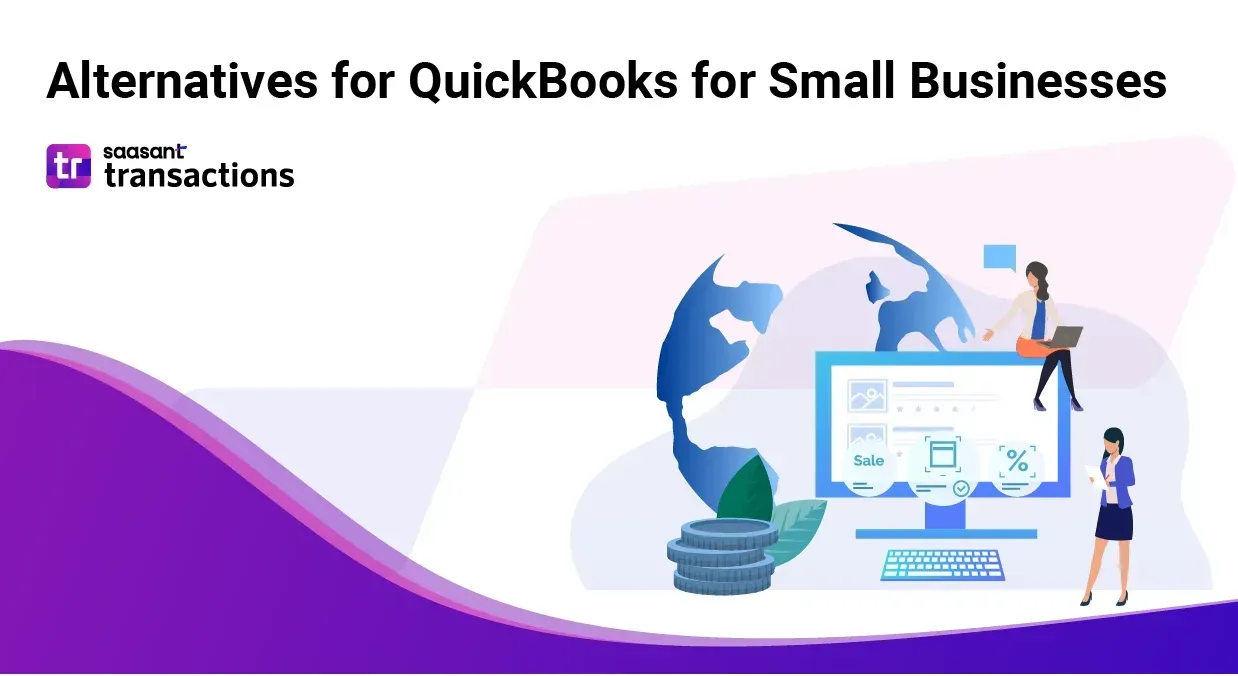
QuickBooks is the go-to option for most accountants and business owners in the US. But there are better choices than QuickBooks. As a small business owner, you might find it challenging to afford or need specific features that QuickBooks doesn’t offer.
That’s why you have alternatives. This quick and insightful piece will discuss the five best QuickBooks alternatives for small businesses.
You’d also know about 5 free accounting software if you’re just starting on your business journey.
Why Do Accountants Look for QuickBooks Alternatives?
With over 5 million users globally, QuickBooks is one of businesses' most popular accounting software. Thanks to its ease of use, scalability, and industry dominance, it has captured an enormous market share. Meanwhile, QuickBooks makes it easy for accountants to monitor the cost of every project at a glance. Tracking project expenses, income, time, and labor is simple.
However, it is also essential to understand that the one-size-fits-all formula no longer works.
Every business has different accounting needs and might require various features. For example, some companies might need software that allows unlimited users, while others might want a robust inventory management system.
As a small business owner, cost is also a huge factor, and you should look for cheaper alternatives to QuickBooks. That said, whether you need a QuickBooks online alternative depends on the features you need and your budget.
What Features to Look for in a QuickBooks Alternative for Small Businesses?
Although every business operates on a different level, and your business might need a few extra features depending on its size and nature, some crucial features are standard to every business. Before you hunt for QuickBooks alternatives, you need to know some of the basic features you can look for in accounting software. Here’s the list
Billing and Invoicing
As your business grows, so does the volume of bills and invoices. Recording these transactions can be time-consuming, costly, and prone to errors. Online software automates this process, ensuring accuracy and efficiency by automatically recording transactions and tracking payments. Additionally, look for software that offers customizable invoice templates and automated payment reminders to streamline the billing process further.
User-Friendly Interface
Accountants track financial transactions to make informed decisions and help the company grow. However, navigating complex software with multiple steps can take time and effort. Choose software with an easy-to-use interface, comprehensive training resources, and tutorials to help users adapt quickly.
Integration with Third-Party Apps
While your chosen software should simplify accounting, it might only fulfill some of your needs. Integrating third-party apps like SaasAnt Transactions and PayTraQer can enhance efficiency in uploading a large volume of your financial data and help with easy bank reconciliation. Ensure the software supports popular integrations like Stripe, PayPal, and various CRM systems.
Financial Reporting and Ease of Bookkeeping
As your company expands, the need for detailed business reports increases. Instead of manually creating reports, opt for software that auto-generates financial reports. This feature enables your employees to conduct in-depth business analyses efficiently. The software should also offer customizable reports and the ability to export data in formats like Excel and PDF.
Quality accounting software should simplify bookkeeping by performing essential functions like bank reconciliation, tax calculation, asset depreciation, double-entry accounting, and invoice management. Ensure the software allows for real-time synchronization with bank accounts and automatic categorization of transactions for enhanced efficiency.
Security & Inventory Management
Financial data is sensitive and vulnerable to breaches. Robust security features like selective user access and data encryption are essential. Additionally, look for software that offers multi-factor authentication (MFA) and regular security audits to protect your information.
Proper inventory management is crucial to avoid disappointing customers with outdated stock information. Look for software with features like stock-in-hand tracking, low inventory alerts, barcode scanning, and integration with e-commerce platforms for seamless updates.
Customer Service & Cloud-Based Software
Robust customer support is necessary to resolve technical issues quickly and help your team understand the software better. Opt for software that offers 24/7 chat support, a detailed knowledge base, and community forums to ensure continuous assistance.
Cloud-based software is ideal for small business owners as it facilitates remote work and allows multiple users to access data without importing and exporting files. Features like automatic backups and mobile app availability enhance data security and provide on-the-go access.
Unlimited Number of Users & Payroll Management
As your business and finance team grows, choose software that allows access to an unlimited number of users. Role-based access controls are essential for managing permissions effectively as your team expands.
Online software simplifies payroll management by automatically calculating salaries, perks, bonuses, deductions, and taxes. Look for features like direct deposit, compliance with tax regulations, and self-service portals for employees to manage payroll information.
Smart Automation
Automation integrates various accounting functions, saving you from the hassle of manually copying data. Ensure the software can integrate payment gateways and bank accounts to track real-time data and make automatic entries. AI and machine learning capabilities can further enhance automation by predicting expenses and detecting anomalies.
Budgeting and Forecasting
Automated accounting software helps create budgets and forecast future revenues and expenses by identifying historical trends and patterns. Look for scenario planning tools and the ability to create multiple budget versions for comprehensive financial planning.
Top 5 Paid QuickBooks Alternatives for Small Businesses
Below is an updated list of the top 5 alternatives to QuickBooks that you can consider, highlighting whether they are free or paid.
1. Xero
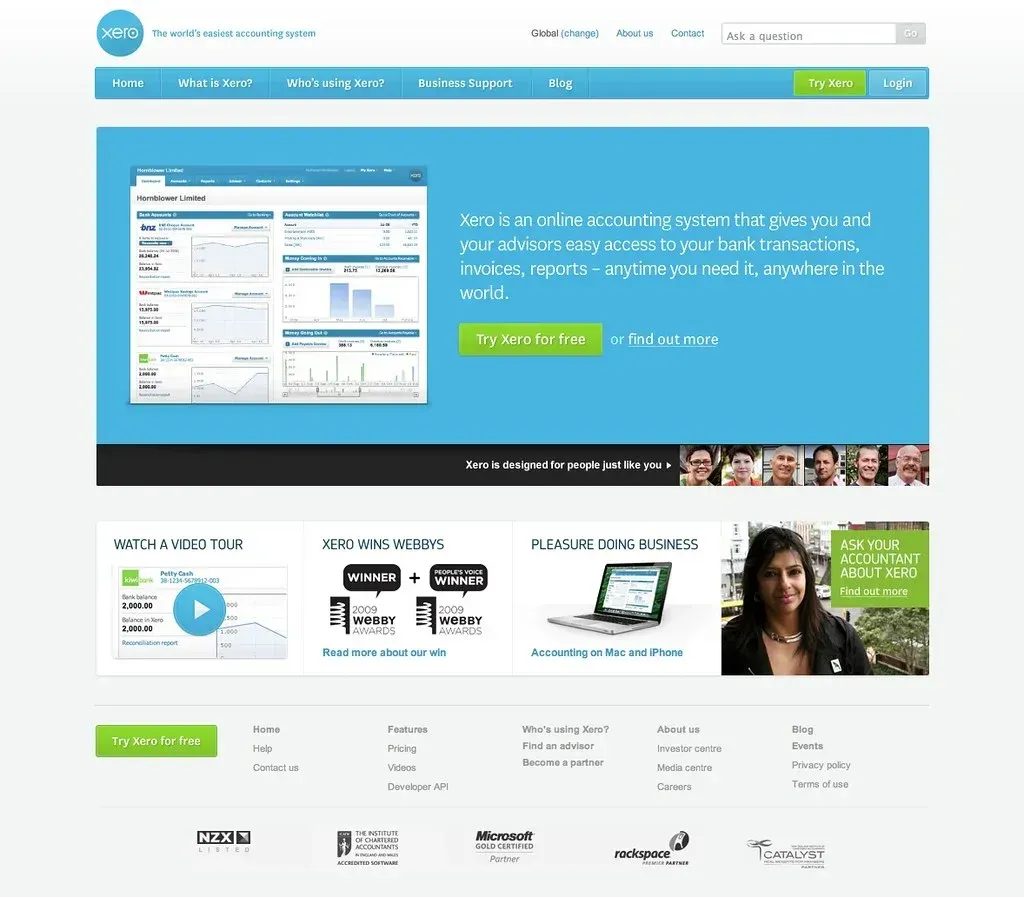
Xero is a popular accounting software known for its simplicity and ease of use. It avoids accounting jargon, making it accessible even to those without an accounting background. Xero provides various features, including unlimited users, fixed assets management, and a user-friendly interface.
Features
Unlimited Number of Users: Add unlimited users without additional fees.
Economical: Price plans range from $11 to $62 per month, making it a cost-effective choice.
User-Friendly Interface: An intuitive dashboard presents critical data like cash flows.
Fixed Assets Management: Track assets like machinery and office equipment.
Xero for Small Businesses
Xero is budget-friendly and scalable, making it suitable for small businesses operating on tight budgets.
2. Sage
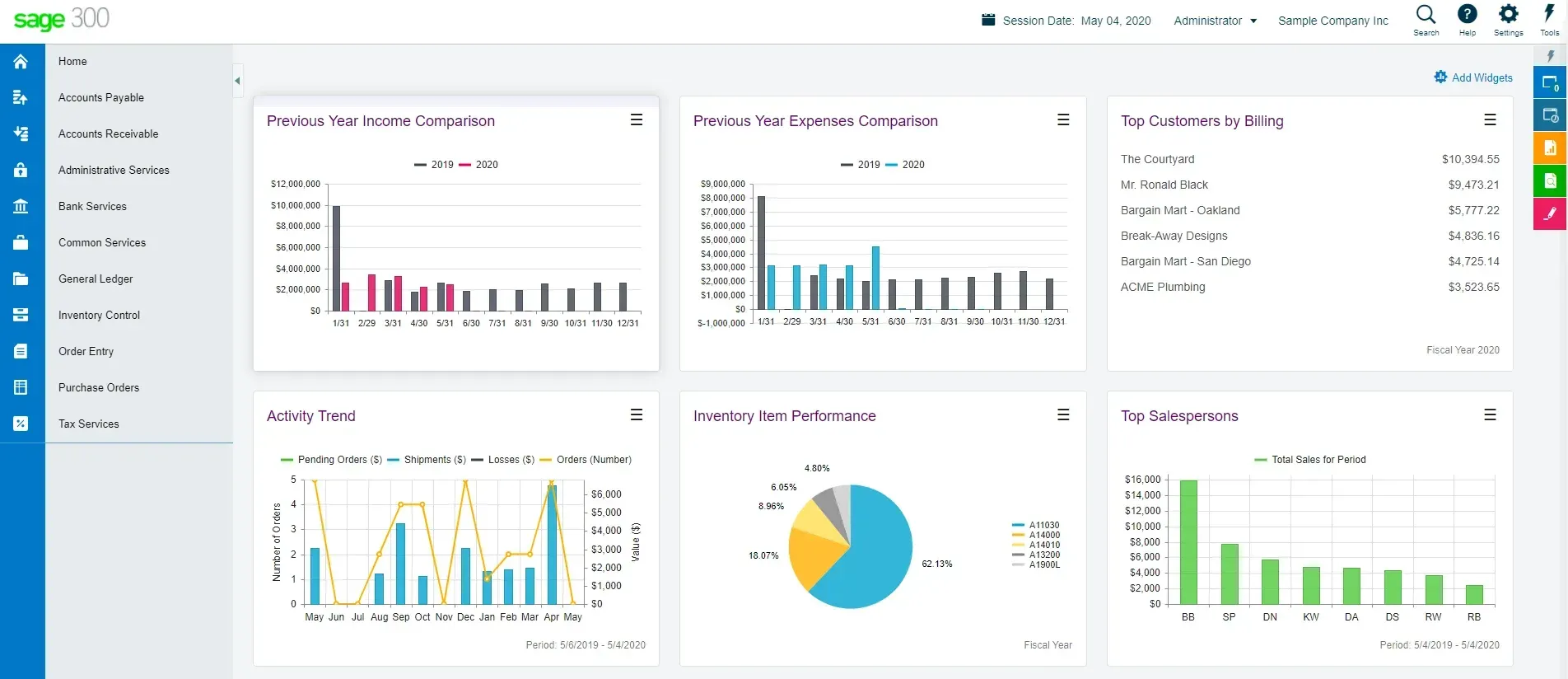
Sage offers a versatile, cloud-based accounting solution. It features robust inventory management, personalized invoices, and employee collaboration on projects.
Features
Employee Collaboration: Multiple employees can collaborate on a single project.
Large Inventory Management: Robust system for managing large inventories.
Personalized Invoices: Customize invoices with your company’s logo.
Sage for Small Businesses
It integrates with Microsoft 365, allowing access to accounts without desktop installations. It is ideal for businesses needing robust inventory management.
3. Zoho Books
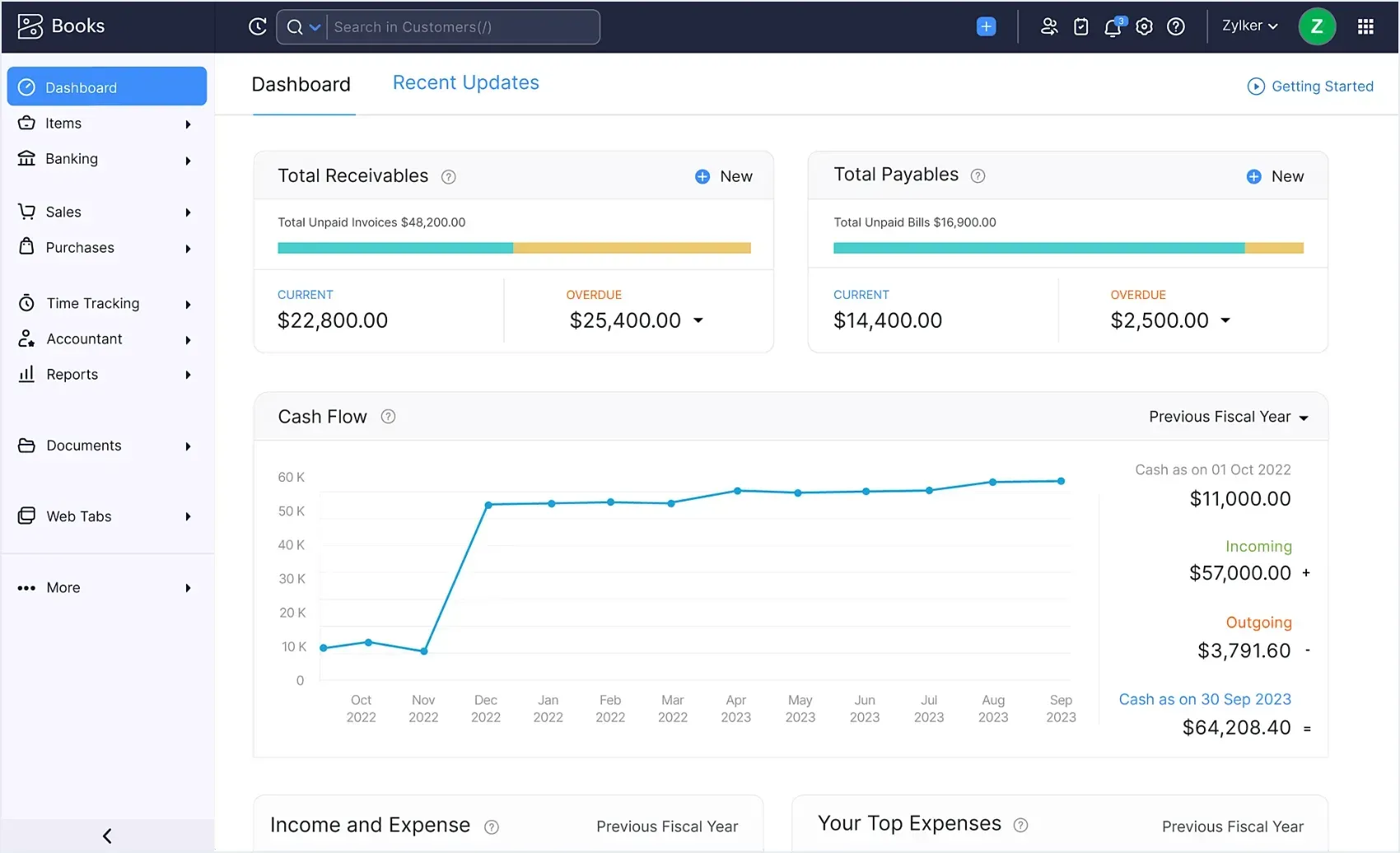
Zoho Books is an affordable accounting solution with features like project management, fixed asset management, and time tracking. It ensures data security and provides excellent customer support.
Features
User-Friendly Interface: Smooth navigation with a comprehensive dashboard displaying critical financial data.
Excellent Customer Support: Support via calls, chat, and email, along with FAQs and forums.
Automated Reports: Over 50 automated reports for business decision-making.
Pre-Built Invoice Templates: 16+ templates to streamline invoice creation.
Zoho Books for Small Businesses
It is affordable and provides automated reports and templates. Excellent customer support makes it ideal for self-employed and small businesses.
4. FreshBooks
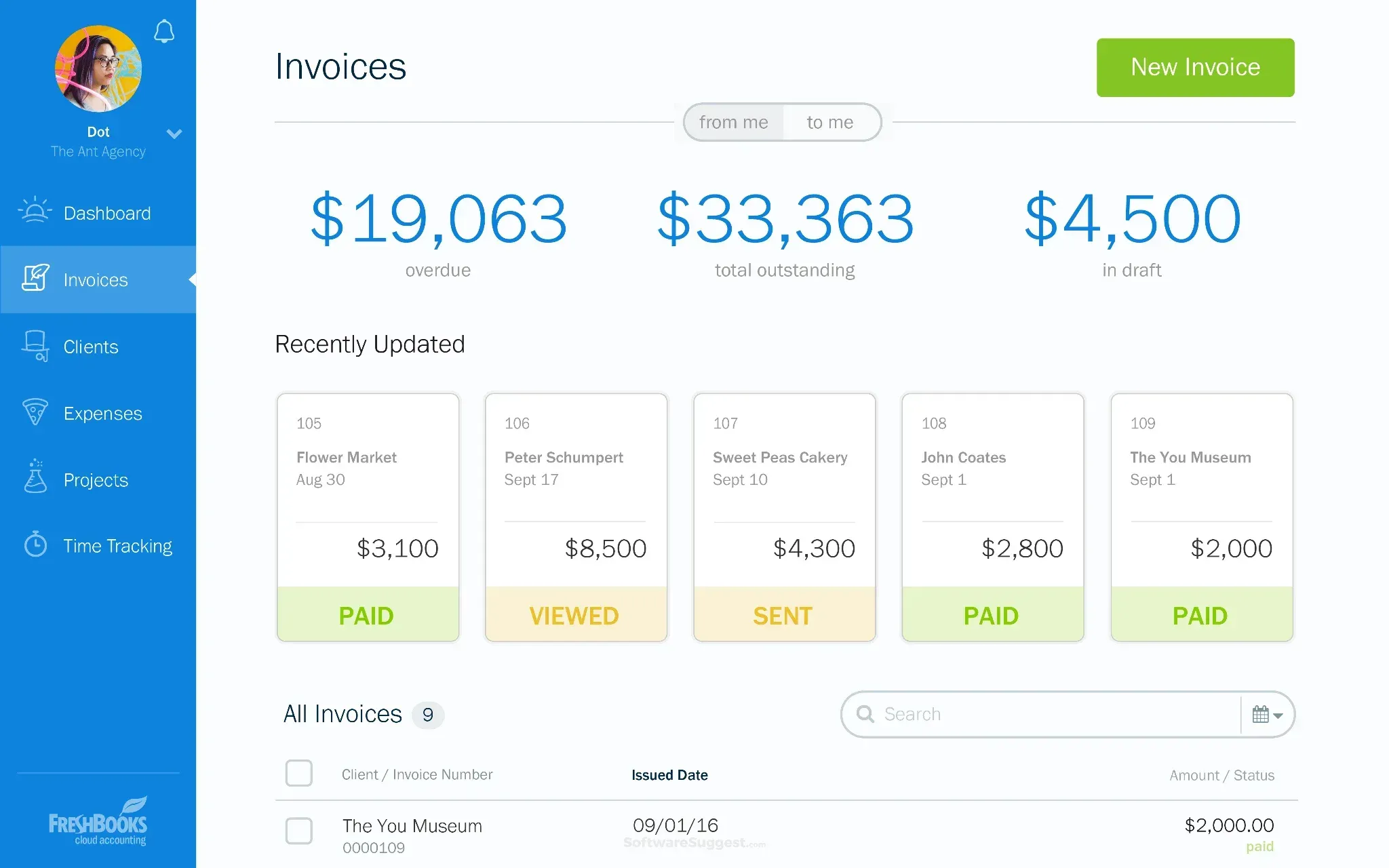
FreshBooks is widely used as an alternative to QuickBooks. It offers double-entry accounting, expense tracking, project management, and robust customer support.
Features
Effective Project Management: Assign projects to team members and clients.
Allows Integrations: Integrate with payment platforms, CRMs, and bank accounts.
Time-Tracking: Suitable for tracking billable hours and expenses.
Economical: Affordable with essential features for small businesses.
FreshBooks for Small Businesses
It is best for tiny businesses and self-employed individuals needing project management and time tracking. Its low cost and comprehensive features make it suitable for project-based businesses.
5. NetSuite by Oracle
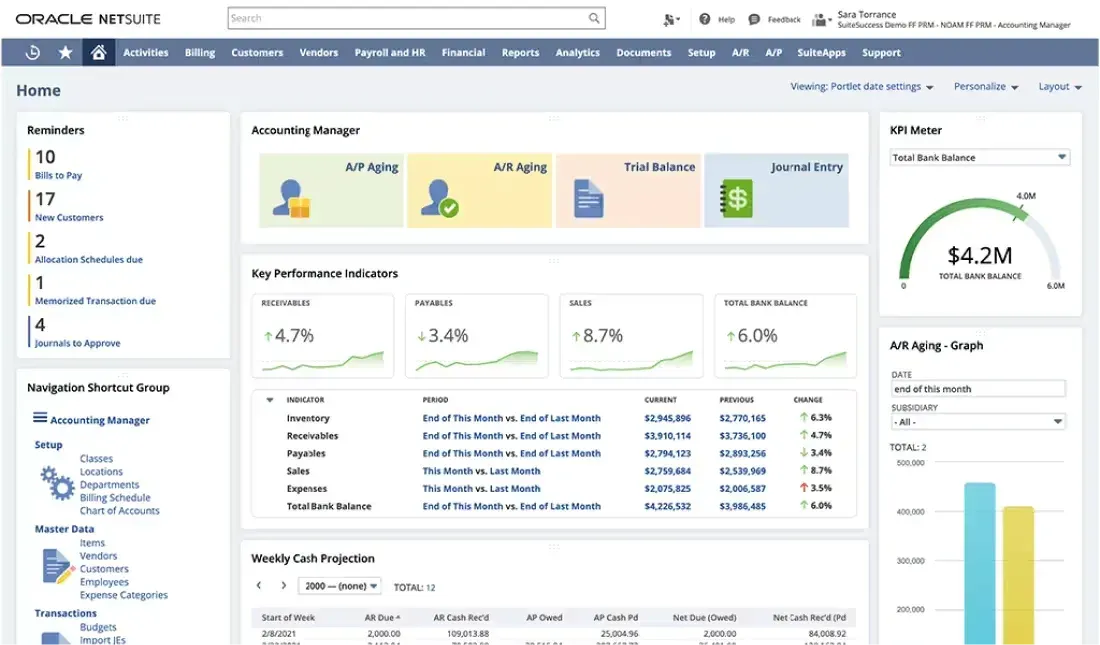
NetSuite by Oracle is a comprehensive cloud-based accounting software known for its robust capabilities and scalability, making it an excellent alternative to QuickBooks. It offers advanced financial management features, seamless integrations, and extensive reporting capabilities.
Features
Advanced Financial Management: NetSuite provides in-depth financial management, including accounts payable and receivable, general ledger, and fixed asset management.
Scalable Solution: Designed to scale with growing businesses, NetSuite can handle complex financial operations and large volumes of transactions.
Extensive Reporting: Offers various customizable reports and real-time analytics to support data-driven decision-making.
Seamless Integrations: Integrates with various third-party applications, including CRM systems, e-commerce platforms, and more.
Cloud-Based Platform: Being cloud-based, it ensures accessibility from anywhere and supports remote work efficiently.
NetSuite for Small Businesses as a QuickBooks Alternative
NetSuite suits medium- or small businesses with complex financial needs and growth ambitions. Its comprehensive features and scalability make it a good choice for businesses looking to expand and streamline their financial operations.
Top 5 Free QuickBooks Alternatives for Small Businesses
Wave Accounting
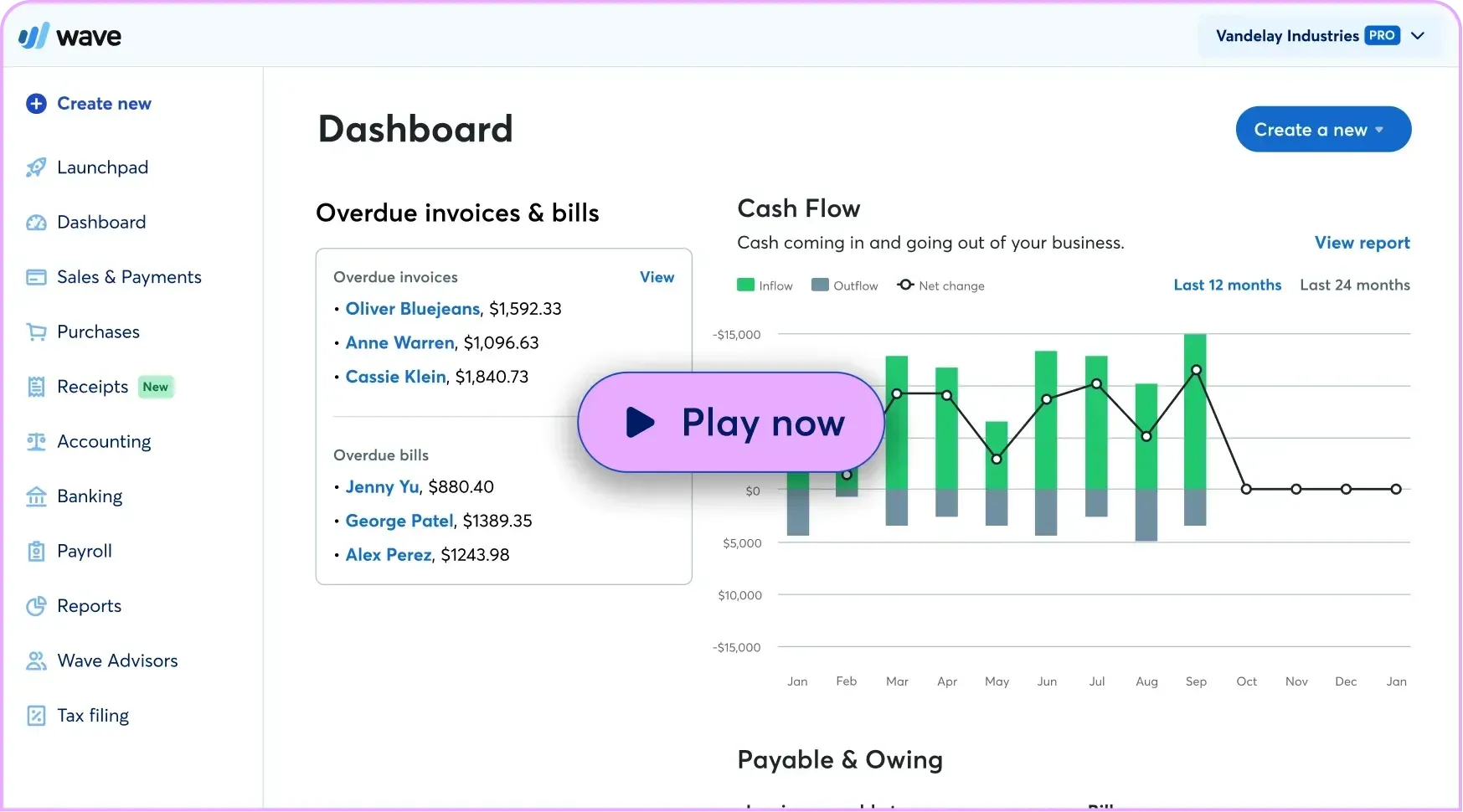
Wave offers a free basic accounting solution with features such as expense tracking, invoicing, and receipt scanning. While its basic functions are free, additional services like payments and payroll are charged.
Wave Accounting Features
Simple User Interface: Easy to use with a layout similar to QuickBooks.
Very Low Cost: Basic services are free; additional features like bookkeeping support and payroll management are available at extra cost.
Invoicing and Reporting: Create branded invoices and track expenses.
Wave Accounting for Small Businesses
Ideal for businesses needing basic bookkeeping and invoicing without advanced features. Additional services can be purchased as required.
GnuCash
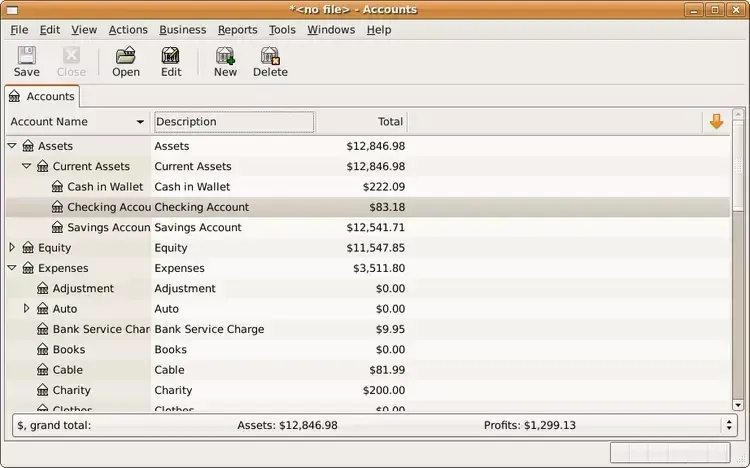
GnuCash is a free, open-source accounting software with robust features suitable for small businesses. It supports multiple platforms, including Windows, macOS, and Linux.
GnuCash Features
Double-Entry Accounting: Ensures that all transactions are balanced and correctly recorded.
Bank Reconciliation: This helps you match your bank statements with your records to ensure accuracy.
Invoice and Billing: Create and manage invoices and customer billing.
Expense Tracking: Track your expenses and categorize them for easy reporting.
Reporting: Generate various financial reports to gain insights into your business’s financial health.
GnuCash for Small Businesses
GnuCash is ideal for small businesses seeking a cost-effective accounting solution with comprehensive features. Its open-source nature allows for customization to meet specific business needs.
ZipBooks
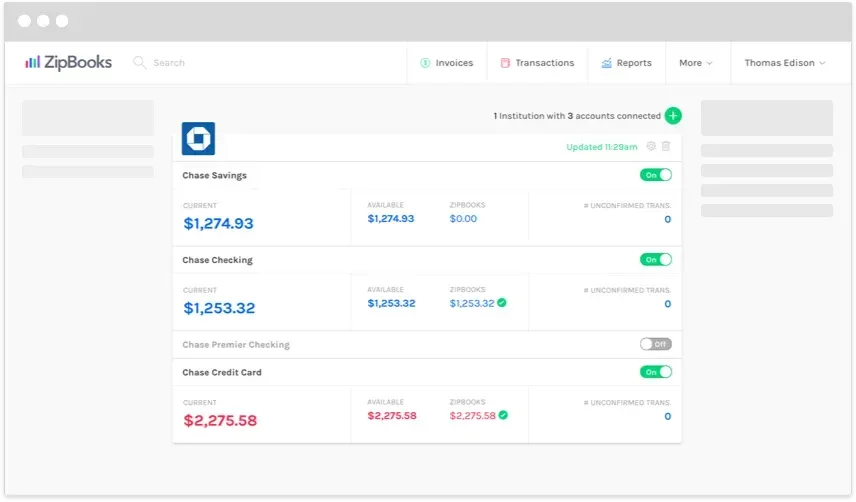
ZipBooks offers a free version of its accounting software that includes essential features for small businesses. It is user-friendly and provides various tools to manage finances effectively.
ZipBooks Features
Simple Interface: Easy-to-navigate dashboard and intuitive design.
Invoicing: Create and send professional invoices to clients.
Expense Tracking: Track and categorize expenses effortlessly.
Financial Reporting: Access basic financial reports to monitor business performance.
Customer Management: Manage customer information and track interactions.
ZipBooks for Small Businesses
ZipBooks is suitable for small businesses that need a straightforward, easy-to-use accounting solution without the complexities of advanced features. The free version is sufficient for basic accounting needs.
Odoo
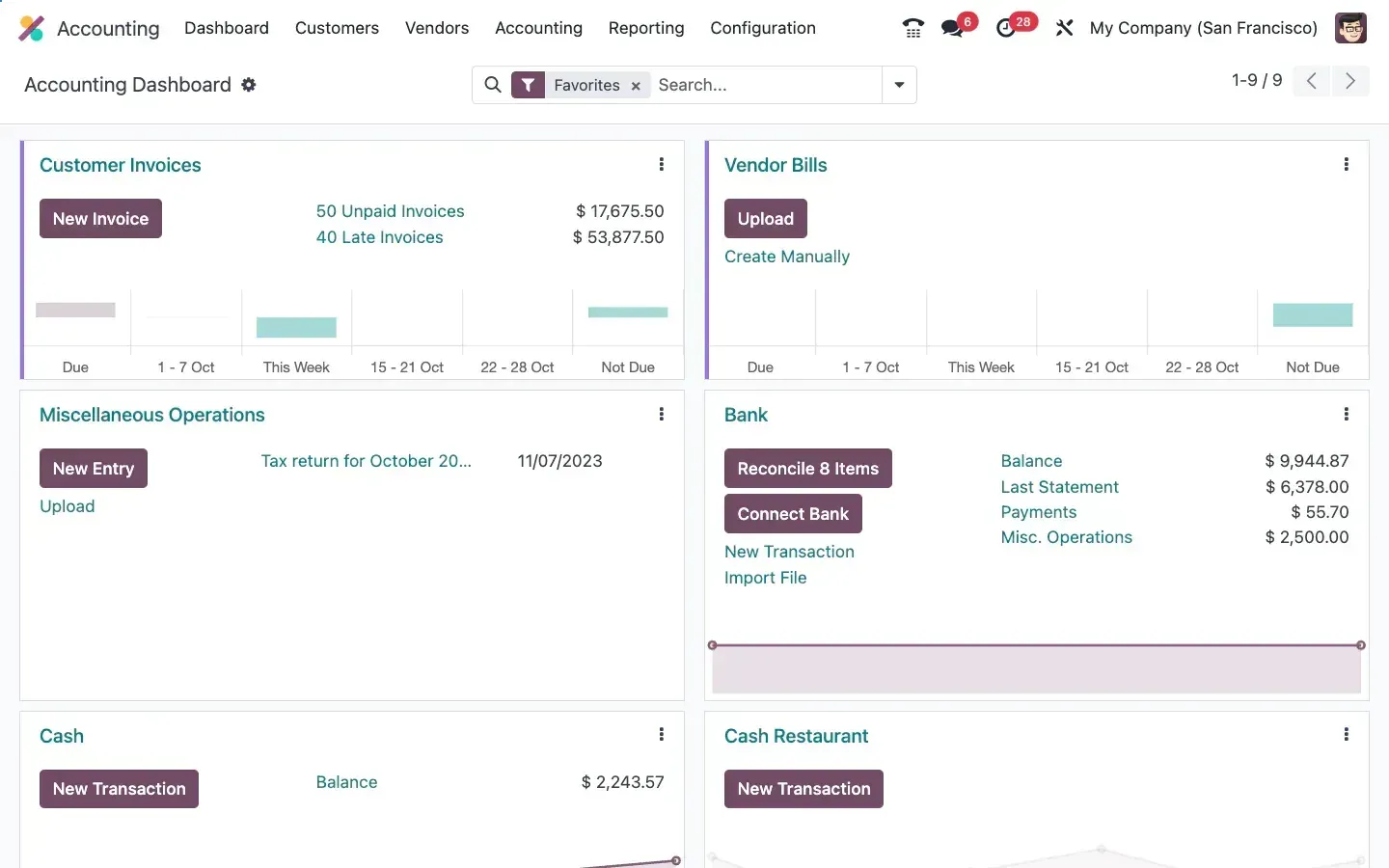
Odoo is a comprehensive, open-source ERP (Enterprise Resource Planning) software with various applications for various business needs. It is modular, meaning businesses can start with basic modules and add more as they grow.
Odoo Features
Invoicing: Automate invoicing payment follow-ups and easily manage recurring invoices.
Expense Tracking: Efficiently manage employee expenses and reimbursements.
Financial Reporting: Generate detailed financial reports for insights into your business’s performance.
Bank Synchronization: Sync with your bank to track transactions and reconcile accounts.
Multi-Currency: Handle transactions in multiple currencies, ideal for international businesses.
Odoo for Small Businesses
Odoo is ideal for small to medium-sized businesses looking for an all-in-one solution that can grow with them. Its modular design allows businesses to start with essential applications and expand as needed. With extensive customization options, Odoo can be tailored to meet specific business requirements.
Akaunting
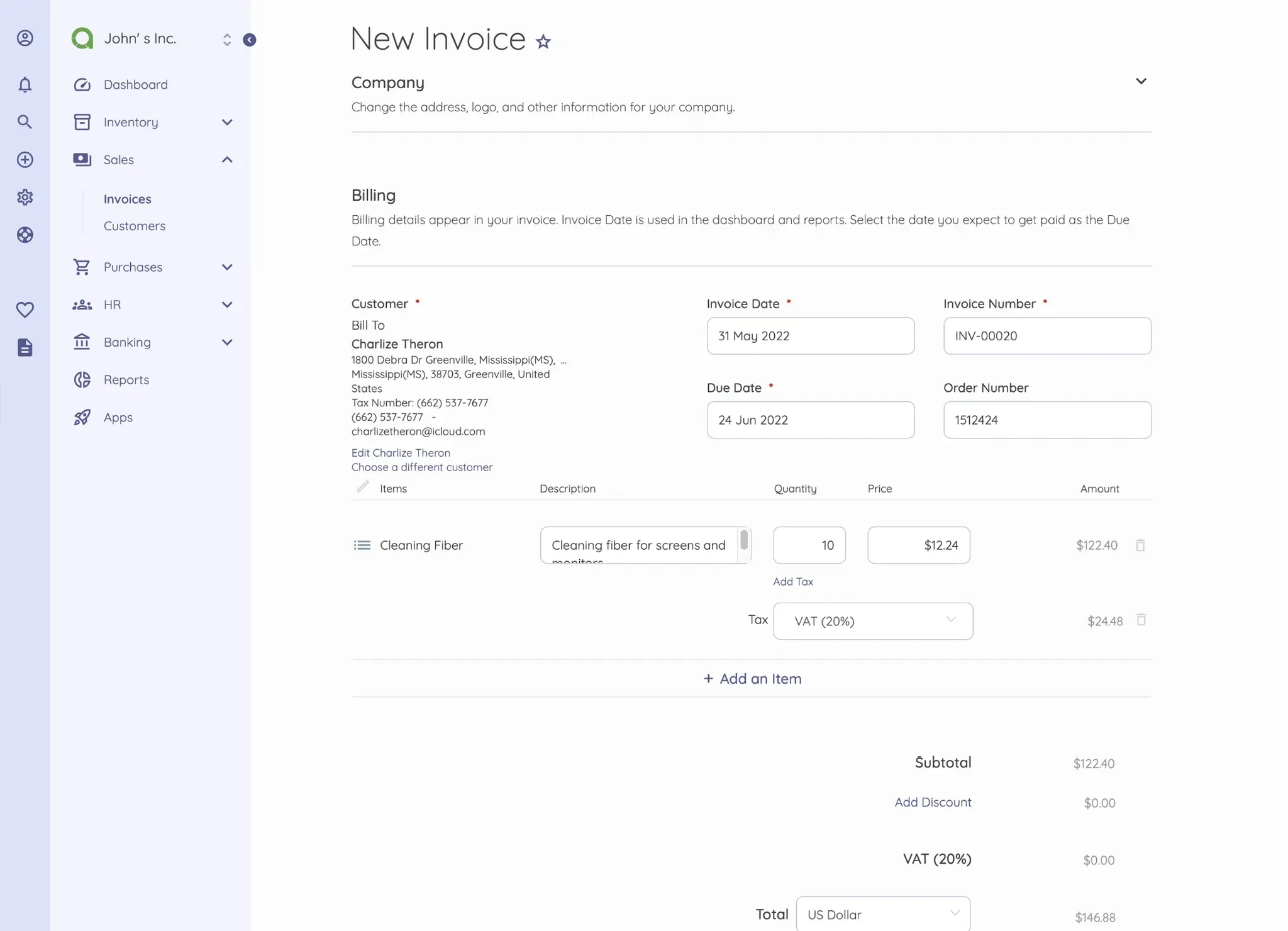
Akaunting is a free, open-source accounting software that offers many features suitable for small businesses. It is web-based, making it accessible from anywhere with an internet connection.
Akaunting Features
Invoicing: Create and send invoices to clients with ease.
Expense Tracking: Manage and categorize expenses to keep track of your spending.
Financial Reporting: Generate various financial reports to monitor your business’s performance.
Client and Vendor Management: Keep detailed records of your clients and vendors.
Multi-Currency: Supports multiple currencies for businesses that operate internationally.
Akaunting for Small Businesses
Akaunting is perfect for small businesses looking for a customizable, web-based accounting solution that covers all the basics. Its open-source nature allows for extensive customization.
So, there are a total of 10 accounting applications mentioned here. Choose either a free or paid version according to your business needs. If you’re just starting your business journey, use a free version and slowly move to paid accounting applications.
FAQs
What Is QuickBooks Online, and How Does It Help Small Businesses?
QuickBooks Online is a cloud-based accounting software designed to streamline business accounting tasks like invoicing, payroll, and transaction tracking. Small businesses benefit from features such as time tracking, workflow automation, and mobile app access. With a free 30-day trial, users can explore these accounting features before committing.
Is There a Free Plan Available for QuickBooks?
QuickBooks does not offer a free plan, but it does provide a free 30-day trial for both QuickBooks Online and QuickBooks Desktop. Small businesses can test its accounting features, such as payroll and invoice management, without immediate commitment.
What Are Some Alternatives to QuickBooks for Small Businesses?
For a free QuickBooks alternative, various accounting software options offer free trials or plans, such as Wave or Zoho Books. These alternatives provide essential accounting features, including invoicing, categorizing transactions, and time tracking.
How Do I Use QuickBooks Online for Payroll Management?
QuickBooks Online simplifies payroll management by automating employee payments, tax filings, and benefits calculations. The software integrates time-tracking features, ensuring accurate payroll reports. Small businesses can try this functionality with a free 30-day trial.
Can I Access QuickBooks Online through a Mobile App?
Yes, QuickBooks Online has a mobile app that allows users to manage invoices, track transactions, and categorize expenses. This is particularly beneficial for small businesses that need to manage accounting tasks remotely.
What Is the Difference between QuickBooks Desktop and QuickBooks Online?
QuickBooks Desktop is a locally installed software that offers robust accounting features but lacks the mobility of cloud-based QuickBooks Online. The latter offers mobile app access, real-time data sync, and a free 30-day trial, making it a better fit for small businesses that need flexibility.
How Can I Categorize Transactions in QuickBooks Online?
In QuickBooks Online, transactions can be categorized based on expense types, such as payroll, utilities, or supplies. This feature streamlines accounting by ensuring accurate financial reports. Small businesses can try categorizing transactions during the free 30-day trial.
How Does Time Tracking Work in QuickBooks Online?
QuickBooks Online includes time-tracking features that allow businesses to record billable hours for employees and contractors. This feature integrates with invoicing and payroll, making it easier to manage workflows. Businesses can test this feature during the free 30-day trial.
What Accounting Features Does QuickBooks Offer for Small Businesses?
QuickBooks offers a range of accounting features, including invoice generation, transaction tracking, payroll management, and time tracking. QuickBooks Online and QuickBooks Desktop offer a free 30-day trial, allowing small businesses to explore these features.
Can QuickBooks Online Be Used by Accountants?
Yes, QuickBooks Online suits accountants and offers features like categorizing transactions, generating detailed financial reports, and managing multiple client accounts. The free 30-day trial allows accountants to explore the platform's full range of features.
How Do I Set up an Invoice in QuickBooks Online?
To set up an invoice in QuickBooks Online, go to the ‘Create Invoice’ section, enter customer details, and itemize the products or services. You can also set up recurring invoices. Small businesses can try this invoicing feature with the free 30-day trial.
Is There a Quickbooks Free Trial, and How Long Does It Last?
Yes, QuickBooks offers a free 30-day trial for both QuickBooks Online and QuickBooks Desktop. This trial allows small businesses to explore essential accounting features, such as invoicing, payroll, and transaction categorization.
Can QuickBooks Online help improve my business workflow?
QuickBooks Online helps improve business workflow by automating critical tasks such as invoicing, payroll, and time tracking. The mobile app ensures that these processes can be managed from anywhere. The free 30-day trial allows businesses to experience these benefits firsthand.
How Does Quickbooks Online Handle Bookkeeping Tasks?
QuickBooks Online streamlines bookkeeping by categorizing transactions, managing invoices, tracking payroll, and offering employee time tracking. Small businesses can test these bookkeeping features during the free 30-day trial.
Does Quickbooks Offer Payroll Services for Small Businesses?
Yes, QuickBooks provides payroll services that automate employee payments, tax filing, and benefits management. These services integrate seamlessly with QuickBooks Online’s other accounting features, and users can explore them with a free 30-day trial.